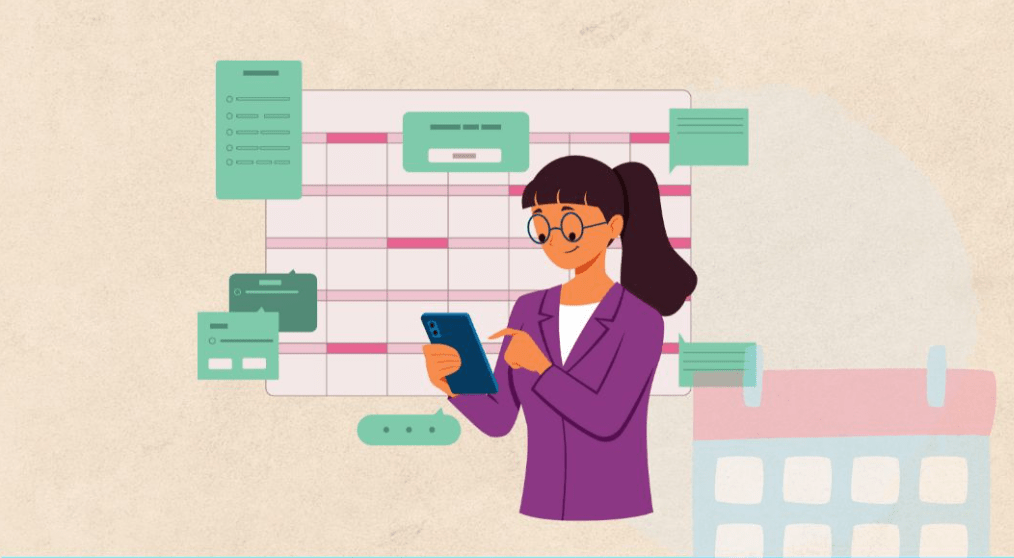Are you curious about what the role of an event coordinator will look like? It’s a fact – technology and innovative trends are reshaping this dynamic profession at an unprecedented pace.
This enlightening article dives into the evolving responsibilities, and skills needed to thrive, and how future technologies can enhance efficiency for these professionals.
Key Takeaways
- The role of an event coordinator is evolving rapidly due to technology and innovative trends in the events industry.
- Event coordinators need skills such as planning, communication, problem-solving, budget management, and knowledge of event trends and technology.
- Responsibilities include planning and executing events, problem – solving and effective communication with team members and stakeholders.
- In the future, virtual and hybrid events will be crucial for event coordination, with technology platforms like monday.com Work OS enhancing efficiency.
Understanding the Role of an Event Coordinator

An event coordinator is responsible for planning and executing events, utilizing their problem-solving and communication skills to coordinate with team members and stakeholders.
Definition and differences from event planners
An event coordinator takes care of tasks for an event. These tasks may be choosing the place or talking to people who sell things. An event planner, on the other hand, makes the whole plan for the event.
They think of what will happen from start to end. So, while both jobs deal with events, they are not the same thing. Both need a sharp eye and good skills. But being an event coordinator is all about doing specific tasks well.
Necessary skills and qualifications
To be an event coordinator, you need to have the right set of skills and qualifications. Here are some that top the list:
| Skill/Qualification | Description |
|---|---|
| Good at planning | Event coordinators make plans. This means setting dates, picking places, and more. |
| Detail-oriented | Each event has many parts. You need to keep track of all of them. |
| Great communication skills | You have to talk with many people in this job. Clients, venues, vendors – they all need your attention. |
| Problem-solving | Not everything goes as planned on event days. You should be able to fix any issues that come up. |
| Budget management | Every event has a budget. You must know how to manage money well. |
| Knowledge of event trends and technology | Knowing about the latest tools can give you an edge over others in this field. |
| Time management | There is always a deadline in this job! So it’s vital to use time smartly and get things done fast. |
Responsibilities of an Event Coordinator

The event coordinator is responsible for planning and executing events, problem-solving, communicating effectively with team members and stakeholders, and ensuring coordination throughout the entire process.
Planning and executing events
An event coordinator must handle a lot of tasks under their role. Here are some key duties:
- First, they have to draw up plans for the event. They decide what will happen and when.
- Next, it’s time to pick the venue. The event coordinator has to find just the right place.
- They also need to hire vendors. This means picking people who will bring food, set up lights and take care of other needs.
- The event coordinator sets up a budget for the event too.
- On the day of event, they make sure everything goes well without any problems.
- After the event ends, they look over all that happened at the event.
Problem-solving and communication skills
Problem-solving and communication skills are essential for a successful event coordinator in 2023. As an event coordinator, you will need to think quickly on your feet and find solutions when unexpected challenges arise during events.
Whether it’s a last-minute change in the schedule or a technical issue with the audiovisual equipment, your problem-solving skills will be put to the test. Additionally, effective communication is crucial as you work with clients, vendors, and event staff.
Clear and concise communication ensures that everyone is on the same page and can result in smoother coordination and execution of events. By honing these skills, you will be well-equipped to handle any situation that comes your way as an event coordinator.
Coordination with team members and stakeholders
An event coordinator works closely with team members and stakeholders to ensure the success of an event. They need to collaborate effectively and keep everyone informed and involved throughout the planning process. Here’s how they coordinate with their team:
| Coordination Method | Description |
|---|---|
| Regular Meetings | The event coordinator holds regular meetings with the team to discuss progress, assign tasks, and address any challenges or concerns. |
| Delegation of Responsibilities | They delegate tasks to team members based on their skills and expertise, ensuring that everyone has a clear understanding of their roles and responsibilities. |
| Timelines and Deadlines | The event coordinator sets timelines and deadlines for each task, keeping the team on track and ensuring that everything is completed in a timely manner. |
| Communication Channels | They establish effective communication channels to facilitate seamless communication among team members, such as using project management tools or communication platforms. |
| Problem-Solving | If any issues arise during the planning process, the event coordinator works with the team to find solutions quickly and efficiently. |
| Stakeholder Engagement | The event coordinator maintains open lines of communication with stakeholders, such as clients, sponsors, or vendors. They gather feedback, address concerns, and keep them updated on the progress of the event. |
| Collaboration | The event coordinator encourages collaboration among team members by fostering a supportive and inclusive work environment where ideas are shared freely. |
| Conflict Resolution | If conflicts or disagreements arise within the team or between stakeholders, the event coordinator acts as a mediator to find common ground and reach resolutions that satisfy all parties involved. |
The Future of Event Coordination

Event coordination will see a shift towards virtual and hybrid events, with technology such as monday.com Work OS playing a crucial role in streamlining processes and enhancing collaboration among team members.
Virtual and hybrid event coordination
Virtual and hybrid event coordination is becoming increasingly important in the events industry. With advancements in technology, event coordinators are now able to plan and execute events that reach a global audience.
By utilizing virtual platforms and tools like monday.com Work OS, event coordinators can seamlessly manage all aspects of an event from start to finish. Virtual events allow for greater flexibility, as attendees can participate from anywhere with an internet connection.
Hybrid events combine in-person elements with virtual components, providing a unique experience for both on-site and remote attendees. This trend is expected to continue growing in 2023 and beyond.
Utilizing technology such as monday.com Work OS
Event coordination is expected to be revolutionized by the use of technology. One such technology that event coordinators can utilize is monday.com Work OS. This innovative platform provides a centralized hub for managing all aspects of event planning and execution.
With monday.com Work OS, event coordinators can streamline communication, track tasks and deadlines, manage budgets, and collaborate with team members seamlessly. The platform also offers customizable workflows and automation features to simplify the coordination process further.
By harnessing the power of technology like monday.com Work OS, event coordinators can enhance their efficiency, improve organization, and ensure successful events.
Release your inner event coordinator with monday.com
Want to unleash your inner event coordinator and stay on top of all your tasks? Look no further than monday.com, the ultimate tool for event coordination. This innovative Work OS platform is designed to streamline your workflow and make planning events a breeze.
With monday.com, you can easily manage budgets, coordinate with vendors, and handle logistics in one centralized place. The platform also offers powerful communication features that allow you to collaborate seamlessly with clients, vendors, and event staff.
Stay organized, track progress, and ensure every detail is taken care of with the help of monday.com. Don’t miss out on this game-changing tool for event coordinators!
The Aleit Academy: A Journey to Becoming a Successful Event Coordinator

Discover the Aleit Academy and unlock your potential as a successful event coordinator. Gain essential skills, qualifications, and insights into future responsibilities in the dynamic world of event coordination.
The Aleit Academy difference
The Aleit Academy is a unique institution that offers comprehensive training and education for aspiring event coordinators. With a focus on practical experience and hands-on learning, the academy equips students with the essential skills and qualifications needed to succeed in the dynamic field of event coordination.
Through immersive courses and workshops, students gain knowledge in event planning, management, logistics, marketing, and more. The Aleit Academy also provides insights into future responsibilities in the industry, preparing students for upcoming trends and technologies in event coordination.
By enrolling at The Aleit Academy, individuals can embark on a rewarding journey towards becoming successful event coordinators.
Essential skills and qualifications for success
To be a successful event coordinator, you need to possess certain skills and qualifications. These include:
| Skill/Qualification | Description |
|---|---|
| Creativity | Having a creative mindset is crucial for coming up with unique and innovative event concepts that will captivate attendees. |
| Attention to Detail | Event coordination requires meticulous attention to detail to ensure all aspects of the event are well-planned and executed flawlessly. |
| Organizational Skills | Strong organizational skills are essential for managing multiple tasks, timelines, and resources effectively. |
| Problem-Solving Abilities | Being able to think on your feet and quickly find solutions to unexpected challenges is a key skill in event coordination. |
| Communication Skills | Excellent communication skills are necessary for working with clients, vendors, and team members, as well as conveying information clearly and concisely. |
| Leadership Qualities | As an event coordinator, you may be responsible for managing a team of staff or volunteers, so strong leadership abilities are important for guiding and motivating them. |
| Tech-Savviness | With the constant evolution of technology in the events industry, having a good understanding of various event management software and virtual platforms is essential. |
| Flexibility | Events often require adapting to last-minute changes or unforeseen circumstances, so being flexible and adaptable is crucial for success. |
A glimpse into future responsibilities
The future responsibilities of an event coordinator will involve staying up-to-date with emerging trends and technologies in the events industry. They will need to adapt to the changing landscape by incorporating virtual and hybrid event coordination into their skillset.
This means coordinating online elements, such as live streaming and interactive platforms, alongside traditional in-person event logistics. Utilizing technology tools like monday.com Work OS can help streamline planning processes, manage budgets efficiently, and enhance communication with team members and stakeholders.
As the role continues to evolve, event coordinators must embrace innovation to deliver memorable experiences for attendees while effectively managing all aspects of event planning and execution.
Conclusion
In conclusion, the role of an event coordinator is dynamic and exciting, requiring a unique set of skills and keen attention to detail. As technology continues to evolve, event coordinators must adapt and utilize new tools to plan and execute successful events.
With the right qualifications and a passion for creativity and organization, anyone can thrive in this fulfilling profession. So why wait? Start exploring your inner event coordinator today!
Frequently Asked Questions
What is the role of an event coordinator?
An event coordinator plans and organizes various aspects of an event, such as venue selection, logistics, scheduling, and coordinating with vendors.
What skills are required to be a successful event coordinator?
Successful event coordinators need strong organizational skills, attention to detail, excellent communication abilities, time management skills, and the ability to work under pressure.
Do I need any qualifications or certifications to become an event coordinator?
While formal qualifications may not be necessary for entry-level positions, having a degree in hospitality management or related field can provide an advantage. Additionally, certifications like Certified Meeting Professional (CMP) can enhance your credentials.
How has the role of an event coordinator changed?
In 2023, the role of an event coordinator has become more dynamic due to advancements in technology and changing trends. Coordinators now have to adapt to virtual events and hybrid formats while still managing traditional in-person gatherings.
What challenges do event coordinators face in 2023?
Event coordinators in 2020 face challenges such as adapting events for virtual platforms, ensuring cybersecurity measures for online events, managing attendee uncertainties due to COVID-19 restrictions or concerns about safety protocols at physical venues.


